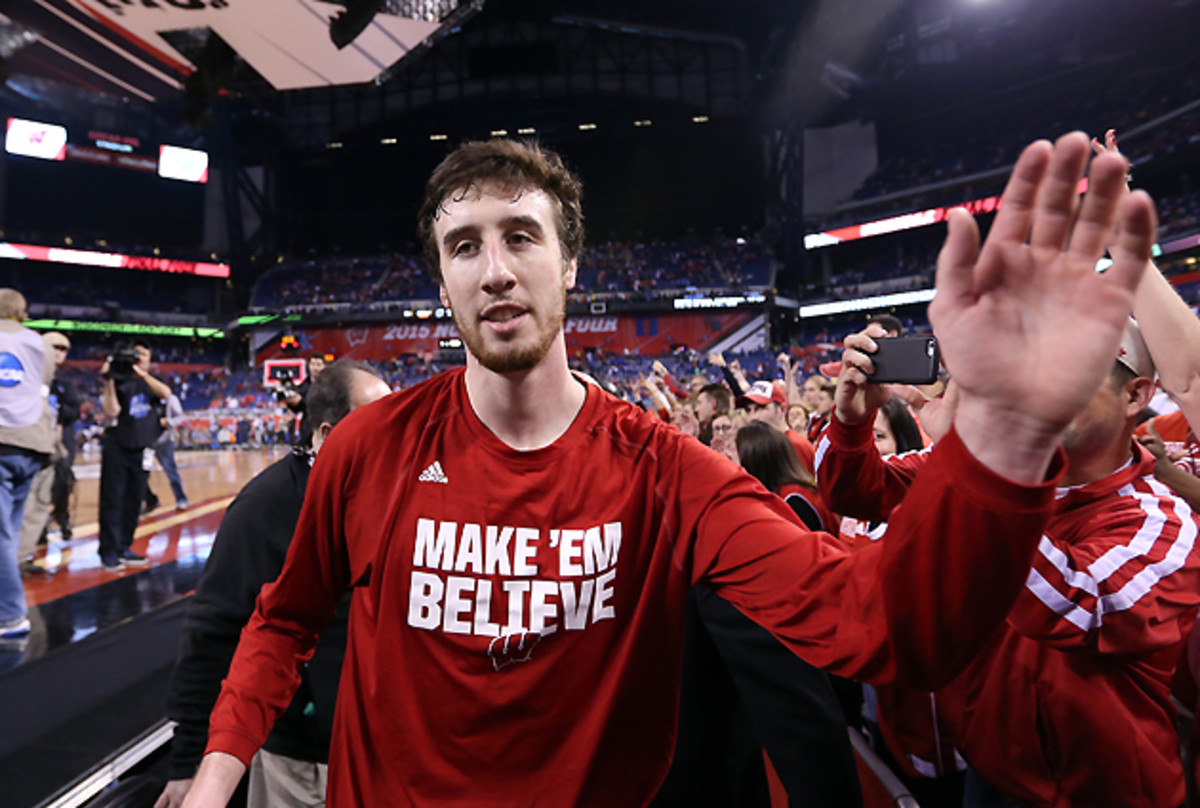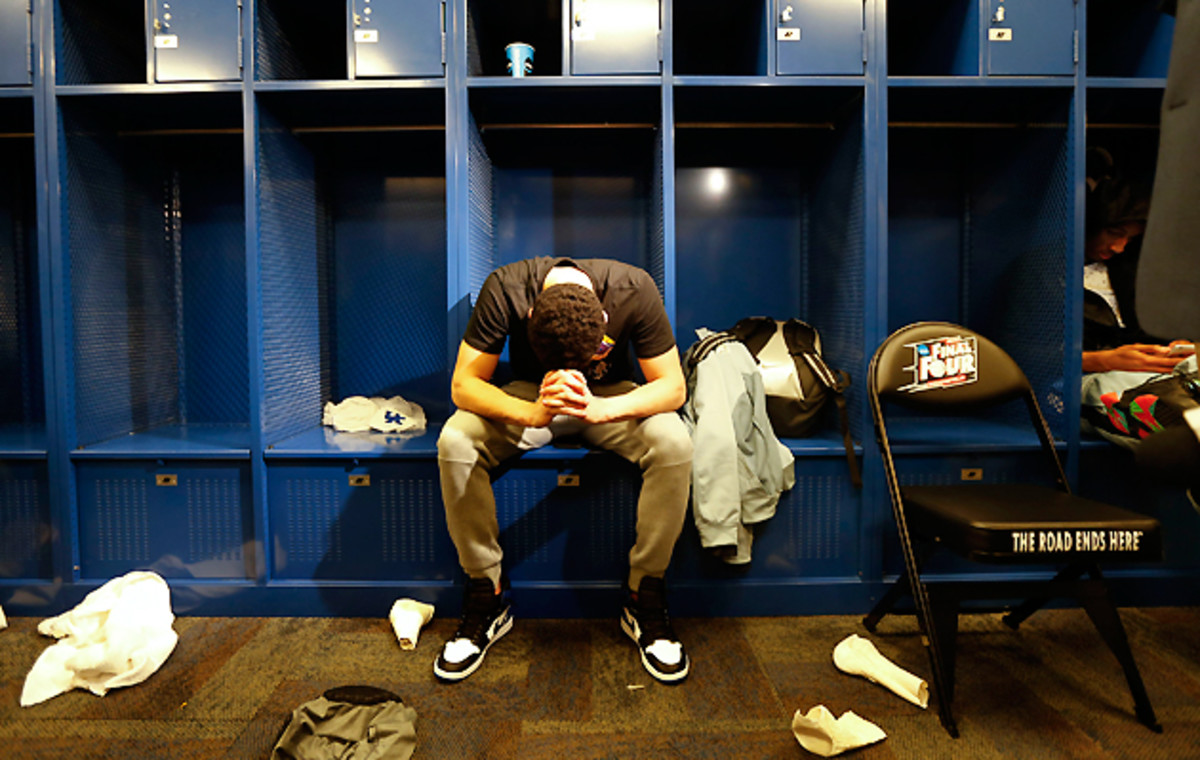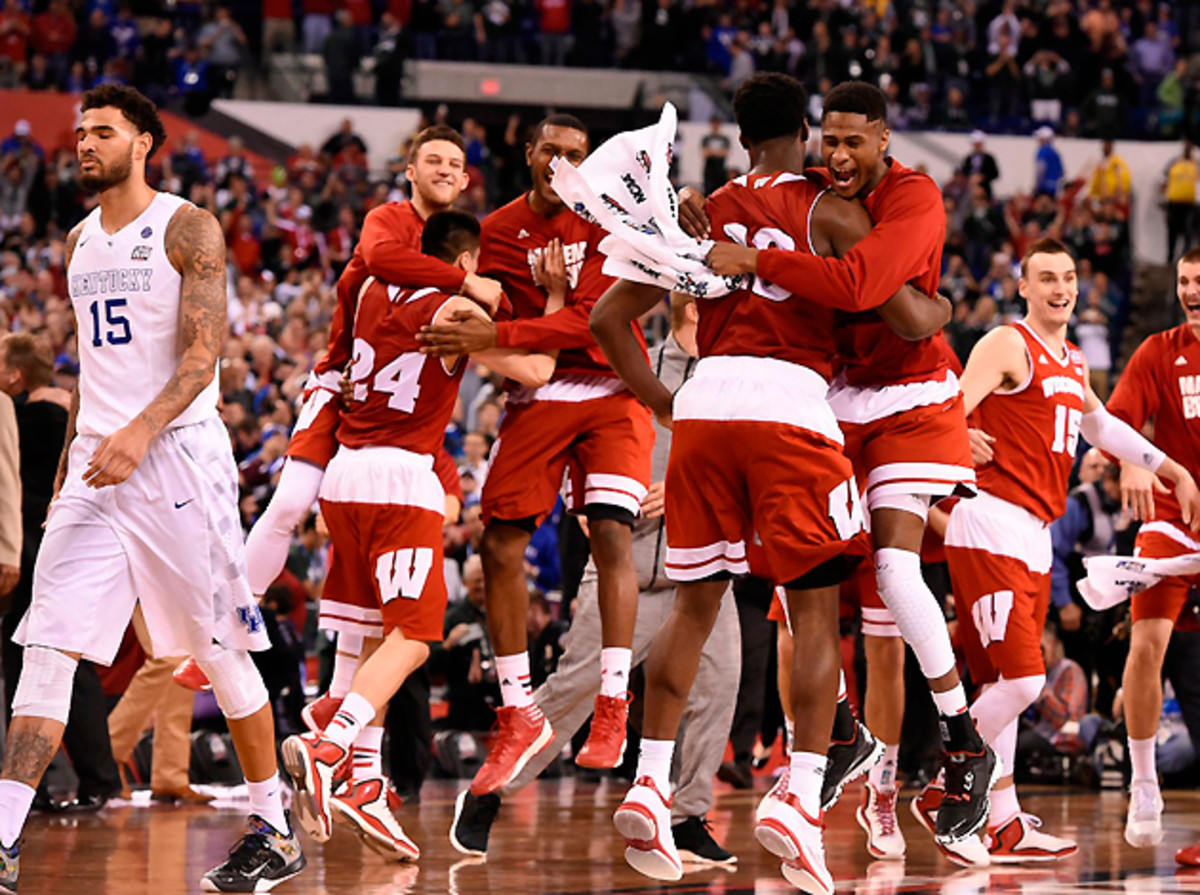Perfection Lost: Kentucky's movie-script season cut short at 38-1

INDIANAPOLIS—You had to believe. If you were playing Kentucky in this NCAA tournament, you had to accept on faith that an upset was possible, there being no odds or evidence supporting your desired outcome, only 34-and-counting articles to the contrary.
Faith, in some cases, was just a way of reframing delusion. I began three weeks in the orbit of the Wildcats, the team vying to become he first undefeated champ since Indiana in 1976, by following their No. 16-seeded opponent, Hampton. For a scouting session on the eve of the opening round in Louisville, the Pirates' coaches wrote BELIEVE at the top of their hotel-ballroom whiteboard. It was their No. 1 key to the game, and they circled it so hard in pink marker that when the board was wiped down afterwards, faint pink circles remained, but nothing was left inside. Right after that, on the way to practice, they got caught in a traffic jam because the Ohio River had crested seven feet above flood level, cutting off their best route to the arena; their bus driver began making ill-advised turns into pockets of cars being driven by Kentucky fans, who were leaving the Wildcats' publicly viewable practice; and the Pirates finally had to get out and walk the final three blocks to the arena.
The feeling from that first day lingered with me for most of the tournament, as Kentucky dispatched Hampton by 23, Cincinnati by 13, West Virginia by 39 and Notre Dame by two, to get to Indy: The sense that everyone else was fighting against this blue current, and while some were capable of staying afloat longer than others, they would all eventually be swept up in the flood.
Loose and can't lose: Wisconsin upsets Kentucky to reach title game
And so it was hard to see this coming, what happened late on the night of April 4 at Lucas Oil Stadium: history being halted. Wisconsin 71, Kentucky 64. Wisconsin's record going to 36-3, Kentucky's to 38-1, once and forever blemished. A result that is likely to be the defining moment of this season. Frank Kaminsky, the goofy, late-blooming senior who said in October, "I don't think I ever would have made it at Kentucky," because he needed not months but years to develop in Madison, scoring 20 points and after the game triumphantly putting on a warmup shirt with the Badgers' season-long motto: MAKE 'EM BELIEVE. It was motto with an origin story that could not be less serious, coined at a basketball camp in Kaminsky's hometown of Lisle, Ill., this summer, when elementary-school-aged campers begged to scrimmage against Wisconsin players who were counselors. The Badgers collectively decided to take no mercy, to, in other words, Make 'Em Believe, and then went and dunked their pint-sized opponents into oblivion, laughing all the way.
That this motto would go on to inspire one of the great Final Four upsets of all time—over Kentucky, a team so freakishly large and daunting that it had been compared to Space Jam's Monstars? Come on. Who would ever believe that?
*****

On the night before their 39th game of 2014-15, the unbeaten Kentucky Wildcats gathered in coach John Calipari's suite at the Marriott Indianapolis Downtown, and he showed them footage of an old race. All season, he had been molding them mentally as much or more than he had been coaching their basketball skills, getting them to accept diminished playing time and smaller scoring roles in a nine- or 10-man rotation that could chase perfection while doing no damage to their draft prospects. They were always less concerned about their opponents than they were about being the best versions of themselves, because they believed they always had more talent, more size and more depth than anyone on their schedule. And on the final weekend of the season, Calipari wanted them to face history head-on.
Copy-'Cats: Coach K returns to title game by borrowing UK's blueprint
What he showed them was the final race of Secretariat, from the June 9, 1973, running of the Belmont Stakes. The biggest and greatest horse ever, running in the third leg of the Triple Crown. Kentucky, Calipari said, was in its own third leg: Louisville, Cleveland and now Indy.
The gun sounded, and they watched Secretariat lag behind a horse named Sham. Calipari paused it and said, "They stayed with him for a while." He compared it to the first five minutes of the game. When Secretariat pulled even on the backstretch, he paused it again and said, "It's coming into halftime. Still a ballgame."
This had happened before. Cincinnati and Notre Dame had stayed even with the Wildcats for a time. But they faded, just like everyone else. They were not the same caliber of horse. Deeper into the race, Secretariat began to pull away, first by a length, then three, then 20, and finally 31 full lengths—so many that CBS had to take a wider angle to show other horses, and announcer Chic Anderson famously proclaimed, "He's moving like a tremendous machine!"
Calipari told them they were like Secretariat, and he did not want them to slow down. They were prepared, they were the best, and now, they had to go out and take it.
"They're playing for trophies," he said of everyone else left in the bracket.
"You're playing for history."
With that in their heads, the Wildcats went off to sleep.
[pagebreak]
******

In truth, there were two tremendous machines in Indy on Saturday. One was Kentucky's defense, which, according to SI's research in February, was statistically the stingiest D of college basketball's entire modern era (1987-present). It entered the game allowing an adjusted 0.86 points per 100 possessions. The other was Wisconsin's offense, which, at an adjusted 1.28 points per 100 possessions, is the greatest scoring attack in the entire era (2002-present) that kenpom.com has tracked efficiency. Although Calipari did not say this to his team, he confided to his wife, Ellen, before the game, "We could lose. They're good enough to beat us. I'll live with it."
Wisconsin proved it could, at the very least, stay with Kentucky for a while. Perhaps like Sham pulling ahead of pole-positioned Secretariat, the Badgers took a 23-14 lead at the 9:16 mark, and stayed even with the Wildcats at halftime. Even though Kentucky was shooting 60% from the field, the score was 36-36.
Wisconsin opened the second half on another ruthlessly efficient run, scoring 16 points on their first eight possessions to take a 52-44 lead, but you still knew it was coming. There would be a time when Kentucky switched into a higher gear, and tried to make its move. It happened just under the 10-minute mark: point guard Andrew Harrison drove, drew a foul and hit two free throws; the Wildcats' defense forced a shot-clock violation; center Karl-Anthony Towns scored on a layup; Badgers guard Josh Gasser got called for a bogus charge that erased a three-pointer; Aaron Harrison hit a driving layup; and Towns delivered a monster possession in which he grabbed two offensive boards and hit a short turnaround over Kaminsky. In that stretch, the score went from 56-52 Wisconsin to 60-56 Kentucky, and during one of the timeouts sandwiched in between, a Lucas Oil Stadium scoreboard flashed an info screen that it innocuously titled "News & Notes".
It was a list of all seven undefeated champions in college basketball history. A list that Kentucky seemed on the way to joining, until Saturday's race went away from its script.
The Wildcats' offense slowed down in the final six minutes. On three straight trips down the floor, they committed shot-clock violations, and as Calipari said afterward, "We're not a team that takes shot-clock violations." Wisconsin crept back in the game, then went up 63-60 on a Sam Dekker three with 1:42 left.
Michigan State's journey finally ends, but Spartans already eyeing return
It was there that the game entered Aaron Harrison Time, the juncture where, if you've been around Kentucky in enough NCAA tournament games over the past two seasons—or if you're just Wisconsin, still stinging from the way its 2014 Final Four trip ended—you either worry or expect that the sophomore shooting guard will do something cold-blooded, the Wildcats will dance off the floor, and the Harrison Twins' father, sitting in the front row, will shrug once again and say of Aaron, "That's just what he does."
With 56.2 seconds left, Aaron hit a driving layup—and got fouled by Kaminsky, making the free throw—to cut Wisconsin's lead to 64-63. Harrison was doing it, and then he wasn't. With the ball back in his hands with under 10 seconds left, trailing by four, he hoisted his final three-pointer of the season—and airballed it, wide left.
"I had my chance," he said. "We just let the game go."
The Harrison brothers walked off the floor without shaking any of the Badgers' hands. Aaron said the whole thing did not feel real. Their minds had been prepared to depart from Indy in a different fashion. "We visualized jumping around, and putting T-shirts and hats on," he said. "We didn't think it was going to end like this."
*******

Wisconsin players leapt into each others' arms at midcourt as if they'd won the national title. The house PA system played House of Pain's "Jump Around," the Badgers' football-game anthem, and the red-clad crowd, heavily outnumbered by all the Kentucky blue, left its feet over and over again. Wisconsin didn't just beat the Wildcats; it humbled their defense to a statistical degree (1.23 PPP) that no other opponent had achieved.
The Wildcats' locker room, when it opened approximately 20 minutes after the game ended, was in a stunned silence. Freshman Tyler Ulis, the defensive leader of their backcourt, sat on a table in the training room, leaning forward with his head hidden in a white towel. When Ulis eventually emerged to take questions in front of his locker, he said, "We know we had a great season, but everybody understands that we did it for nothing."
For him, and for most of them, it was history or bust. Assistant coach John Robic, the Wildcats' primary game-planner, lamented that the kids were too young to realize the history of what they'd done, even while coming up short. "We had a heck of a run," Robic said. "I don't think it'll ever happen again. And if it does, I want to be a part of it." Calipari, too, said, "We would have loved to be 40-0. Let's see if we can take another stab at it. But 38, what these guys did in a row? Incredible stuff."
Willie Cauley-Stein, the freakishly athletic and versatile 7-footer who was the face of Kentucky's defense and also its chief locker-room philosopher, tried to come to grips with this team's legacy. As a junior who's almost certainly headed to the NBA, he will not have another stab at perfection. He acknowledged the reality that they'd be remembered foremost for coming up short.
Back in December, after the Wildcats beat Texas to get to 8-0, Cauley-Stein confided in a close friend that he felt like he was living in a movie. As a freshman he dealt with the burden of being on the worst Kentucky team of the Calipari Era—the one that infamously lost in the first round of the NIT to Robert Morris—and as a sophomore he suffered a foot injury in the Sweet 16 that robbed him of a chance to chase a national title. But this season was different. Everything was going so right. He didn't just want it to conclude with him getting off a bus or a plane, in Lexington, holding a trophy in front of 10,000 fans—he believed that would conclude that way.
"Everything," Cauley Stein said, "felt like it was building to a peak."
When Kentucky was taken to the wire by Notre Dame in the Elite Eight, he called it the killer plot twist. And then Wisconsin hijacked his script with a devastating ending: 38 and done.
Now, Cauley-Stein said, "It's like a movie like when the main character dies. And you're like, WHAT? Why did the main character die? And you're just super hurt. ... The guy that you never suspect is gonna die ends up dying, and that's the end of the movie. No cliffhangers, no nothing. It's just boom—you're done.
"That's the way it feels. That's the way it ends."
